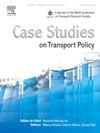Modeling perception towards sustainable ferries through ridership surveys: A case study of Michigan islands with policy implications
IF 2.4
Q3 TRANSPORTATION
引用次数: 0
Abstract
Many island communities rely on ferries as their sole mode of transport to access healthcare, education, and economic opportunities, aside from region connectivity. With sizeable ferry operations throughout the country, the carbon footprint of marine transportation, including passenger ferries, cannot be overlooked. Discussions of environmental sustainability have gained considerable momentum in recent years, especially in decarbonizing the transportation industry. While many studies have explored sustainable ferry operations from the lens of operators, users’ perspectives are less explored. Users’ expectations, experiences, socio-demographic heterogeneity, and sensitivity to pricing may correlate with their opinions on environmental sustainability of ferry services and need to be understood. This study delves into the nuanced relationships between users’ profiles and their willingness to support sustainable ferry initiatives through a comprehensive survey across four major islands in Michigan and utilizing Structural Equation Modeling (SEM). Key findings indicate that negative experiences drastically impact user satisfaction and attitudes toward sustainability, highlighting the crucial role of operational reliability in fostering support for environmentally friendly upgrades. Furthermore, the study reveals significant disparities in sustainability support between tourists and residents, with demographic factors like gender and income significantly shaping sustainability preferences. This underscores the need for targeted communication, policy framing strategies, and consideration of socio-economic ramifications that address these disparities to ensure the successful implementation of sustainable practices in ferry operations This research aids policymakers in crafting targeted interventions that ensure the dual goals of environmental sustainability and mobility justice are met. Overall, this research presents a practical framework for evaluating policy impacts on ferry service users, with implications extending beyond the Michigan islands to similar ferry-dependent communities.
通过客流量调查对可持续渡轮的认知建模:密歇根岛屿的政策影响案例研究
许多岛屿社区依靠渡轮作为唯一的交通方式来获得医疗保健、教育和经济机会,除了区域联系之外。由于全国各地的渡轮业务规模庞大,包括客运渡轮在内的海洋运输的碳足迹不容忽视。近年来,关于环境可持续性的讨论取得了相当大的势头,特别是在使运输业脱碳方面。虽然许多研究从运营商的角度探讨了可持续渡轮运营,但用户的角度却很少被探索。用户的期望、经验、社会人口异质性和对定价的敏感性可能与他们对渡轮服务环境可持续性的看法有关,需要了解。本研究通过对密歇根州四个主要岛屿的全面调查,并利用结构方程模型(SEM),深入研究了用户资料与他们支持可持续渡轮倡议的意愿之间的微妙关系。主要研究结果表明,负面体验极大地影响了用户满意度和对可持续性的态度,突出了运营可靠性在促进对环境友好型升级的支持方面的关键作用。此外,研究还揭示了游客和居民对可持续发展支持的显著差异,性别和收入等人口因素显著影响了可持续发展偏好。这强调了有针对性的沟通、政策框架战略和考虑社会经济后果的必要性,以解决这些差异,以确保成功实施轮渡运营的可持续实践。这项研究有助于决策者制定有针对性的干预措施,确保实现环境可持续性和流动性公平的双重目标。总的来说,这项研究提出了一个实用的框架来评估政策对渡轮服务用户的影响,其影响超出了密歇根群岛,延伸到类似的依赖渡轮的社区。
本文章由计算机程序翻译,如有差异,请以英文原文为准。
求助全文
约1分钟内获得全文
求助全文

 求助内容:
求助内容: 应助结果提醒方式:
应助结果提醒方式:


